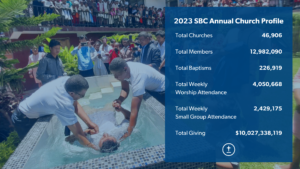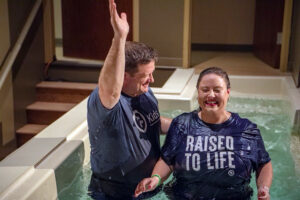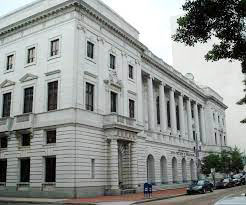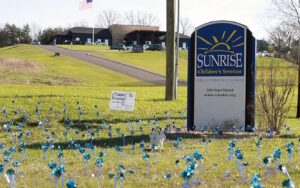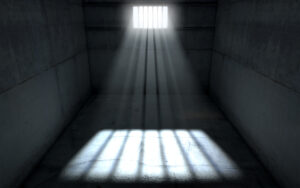
WASHINGTON (BP)–Legislation classified as a protection for the free-speech rights of churches not only is “woefully inadequate” but “dangerous,” Southern Baptist church-state specialist Richard Land told Speaker of the House Dennis Hastert in a June 9 letter.
Land, president of the Ethics & Religious Liberty Commission, thanked Hastert for his attempt to protect the rights of churches but said the ERLC “must oppose” a provision titled Safe Harbor for Churches.
The measure, added to a tax reform/jobs creation bill, H.R. 4520, supposedly would protect pastors and other religious leaders regarding comments they make as private citizens on political campaigns and “unintentional violations” of the Internal Revenue tax code by churches and other religious bodies, as well as their leaders. Financial penalties would be implemented when a religious group or leader intervenes in a political campaign, but the organization’s tax-exempt status would not be threatened until there are more than three violations in a year.
The result of the legislation would not be a safe harbor but “an unacceptable intrusion of the IRS into the business of a church,” Land told Hastert.
Pastors and other religious leaders already can comment on elections as private citizens, so that part of the provision is “meaningless,” Land said. “But what is worse, the paragraph actually prohibits a religious leader from expressing his personal opinion about a political campaign at ‘an official function’ of his church. Who will determine what serves as an ‘official function?’”
The ERLC also opposes “the intrusion by the IRS into the church’s life and business that would be required to determine whether or not an infraction was intended,” Land said in the letter. “Intent is a difficult thing to prove, and we can imagine a church incurring considerable expense in time and energy attempting to defend itself against an IRS determination.”
The measure’s provision for penalties against churches based on their “political activities” instead of their “political expenditures” is unacceptable as well, Land wrote, noting, “This change exposes churches to a much broader scrutiny and liability,” he said.
The language also fails to restore free-speech rights “stolen from churches” when Congress adopted in 1954 a measure to bar tax-exempt organizations such as churches from participation or intervention on behalf of any candidate in an election campaign, Land told Hastert. That 50-year-old law has had a “chilling effect” on churches and preachers, he said.
“Today, many congregations and church leaders have been completely silenced because of their fear” the IRS will rescind their tax exemption, Land said.
“While we would counsel churches not to endorse candidates, and to exercise great caution in engaging in campaign speech and activity if their historic free-speech rights were restored,” Land said, “we believe that it is the churches, not the government, that should decide these issues.”
Land has used the same argument in the ERLC’s support for another measure that is designed to restore freedom of speech by pastors and churches on election campaigns and related issues. The Houses of Worship Free Speech Restoration Act, H.R. 235, would prevent a church’s tax-exempt status from being affected by the “content, preparation or presentation of any homily, sermon, teaching, dialectic or other presentation made during religious services or gatherings.”
Such protection for churches and other religious bodies is needed, but he does “not believe it is wise, prudent or appropriate for Baptist churches to endorse candidates,” Land said.
Church-state separationist organizations harshly criticized the Safe Harbor measure, including the timing of its introduction shortly after an outreach through churches by President Bush’s re-election campaign was revealed.
The Bush-Cheney national headquarters asked its Pennsylvania staff to identify 1,600 “Friendly Congregations” in the state where a volunteer could be found to distribute updates or voter registration information in a “place accessible to the congregation,” The New York Times reported June 3, citing an e-mail from a campaign worker.
The ERLC’s Land acknowledged he “would not be comfortable” if he were a pastor in allowing a church member to distribute information for a campaign.
“I would say to my church members, ‘We are going to talk about the issues, and we are going to take information from the platforms of the two parties about where they stand on the issues,’” Land said. “I would tell them to vote and to vote their conscience, and the Lord alone is the Lord of the conscience.”
The ERLC has initiated a nonpartisan effort to register new voters and to educate voters. Information on the initiative may be accessed at www.ivotevalues.com.
The House of Representatives defeated a previous version of the Houses of Worship bill in 2002, but it has not acted on it in this Congress. Rep. Walter Jones, R.-N.C., is the chief sponsor, and he has 165 co-sponsors.
In addition to the ERLC, other supporters of Jones’ bill are the American Center for Law and Justice, Family Research Council, Focus on the Family, National Right to Life Committee, Priests for Life and Americans for Tax Reform.
Opponents of Jones’ legislation include the Baptist Joint Committee on Public Affairs, Americans United for Separation of Church and State, National Council of Churches and the Anti-defamation League.
–30–




